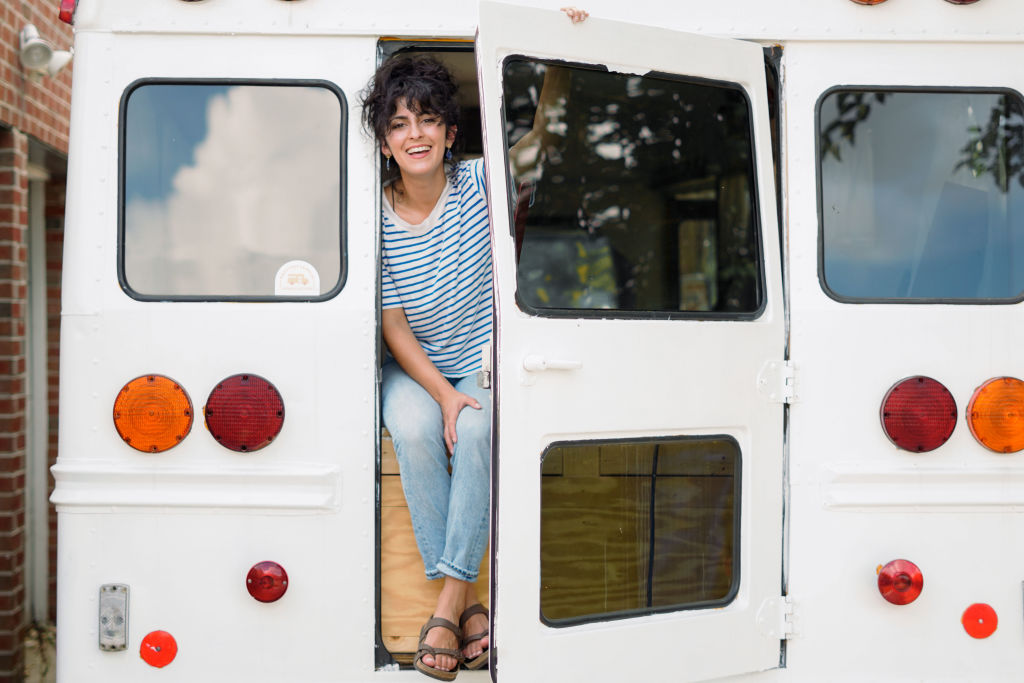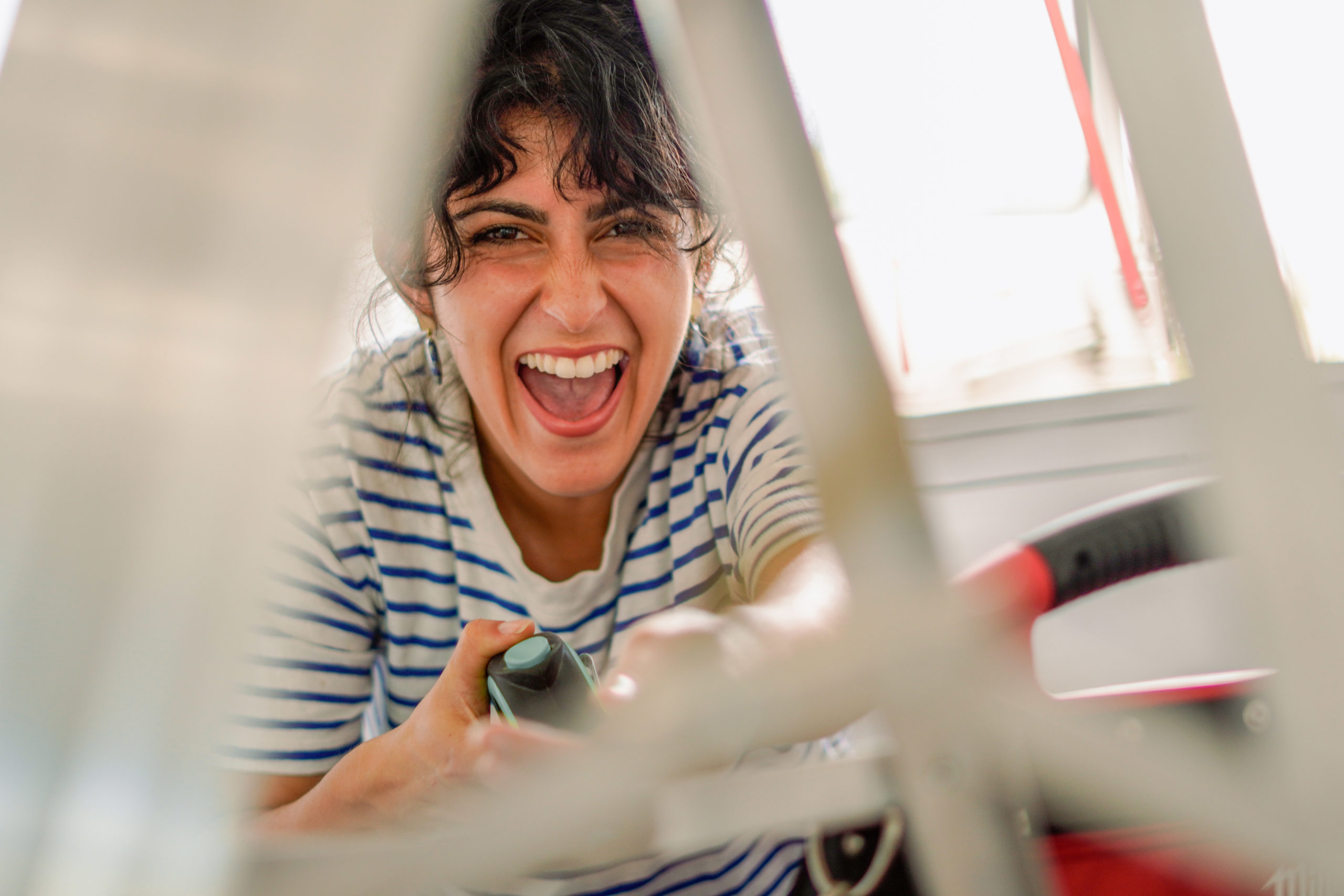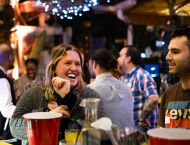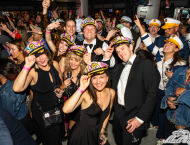Life
 Leah Judson. Photo by Andrew J. Williams III.
Leah Judson. Photo by Andrew J. Williams III.
One Bus + Seven Stories
September 1, 2021 @ 10:00am
Leah Judson is a visionary storyteller and community builder. She’s also a badass, one-woman wrecking crew with a heart of gold, who is intensely focused on rewriting the stories society tells itself about what young people are capable of and what they can contribute to the world.
Judson will soon embark on a three-month voyage across the U.S. Traversing the corners of the country — from D.C. and Maryland to Florida, Arizona, New Mexico and as far as California — she’ll hit the open road armed with a travel companion, video equipment and a promise to document seven remarkably ordinary lives, at least in her eyes. Her ambitious project, Before We Could Drink (BWCD), will chronicle the stories of youth accomplishing great things -— hopefully helping them discover their power to inspire themselves and others.
To understand what provoked this bold pilgrimage, you’ll need to travel back in time to the days before the pandemic. The project was called Behold.Her, which launched in 2016, unknowingly laying the foundation for BWCD.
It was the perfect marriage of Judson’s love for people, story and art.
Building An Intimate Community
“[Behold.Her] was centered around creating this intimate environment for women, where they could [really] get to know themselves,” Judson remembers fondly. “A lot of assumptions are built around women, and sometimes we’re not forming relationships in their most honest and purest form. I wanted to create an experience where defense mechanisms and filters were stripped away.”
This was much more than your typical networking event. Two to four times a month, women from all walks of life gathered together in spaces provided by women-led or owned businesses throughout the District. On this raw, almost sacred meeting ground, the distractions of the outside world melted away.
Over the course of the project, 400 women were voluntarily photographed, filmed, interviewed and given the rare opportunity to share the unadulterated truth about themselves and their lives while building new friendships.
“It created this archive of voices that really showcased the woman behind the office desk, or the hill worker,” Judson says. “It showed a mother that was conflicted with something.It showed another person who’s struggling with a family relationship, and highlighted things that we should feel more joyous about.”
After Behold.Her’s initial event, Judson was filled with an overwhelming sense of purpose. For four years, the project was the personification of empowerment — but, then it was suddenly, cruelly gone. As the pandemic took root in March 2020, upending our lives, this powerful place of liberation vanished, leaving a tremendous void in Judson’s life.
“Over the past couple of years, it gave me a lot of pleasure to be identified as a community leader for women here in the city,” Judson shares, with a sense of gratitude and loss filling her voice. “When the pandemic hit, it stripped away the opportunity to create these types of events.”
Unable to truly fulfill Behold.Her’s promise to maintain this growing community for women, she spent the rest of the year contemplating what came next.
Home Is Where the Heart Wanders
Judson’s wandering spirit took her on a solo road trip into the wilderness, passing through Idaho, Oregon, Washington State and Wyoming. For the entire month of October 2020, she hiked, camped, got lost, found her way again and sought comfort in her fleeting interactions with strangers.
Clad in a knee-long puffer coat with fake fur, she was a self-described “Tundra Brown Barbie” escaping the frantic pace at which life moved in D.C.
“[In D.C.], I had this endless list of things that needed to be accomplished, but they weren’t fulfilling for me,” Judson says. “I missed being outdoors and being able to shut the world off. I missed making relationships in person as well.”
Still, Judson was searching for something she couldn’t quite pinpoint — a connection she’d lost in Behold.Her’s absence.
“I ended up spending the year trying to figure out how I [could] create the same level of intimacy and storytelling, but not necessarily in the same way.”
Judson finally discovered what was missing. The random souls she encountered during her wilderness journey were “a beautiful reminder” of the interconnectedness of the world around us, even when we feel disconnected.
“We don’t really take the time to see that [connection] because we’re so busy,” Judson shares. “We’re stuck in our own little world, our own head and our own problems.”
This meditative space was the launching pad for BWCD. Judson wanted to do something groundbreaking and adventurous — and do something to showcase what she considered society’s greatest asset: young people.

Leah Judson. Photo by Andrew J. Williams III.
The Fire of Youth
Before We Could Drink is perhaps the greatest culmination of Judson’s gifts: her eye for photography, videography, heart for emotive storytelling, adeptness for community building and kinship with young people.
“[I wanted to] seek out young people who are going above and beyond,” Judson says. “But more importantly, I wanted to create a series where we’re getting to know each other the entire time and creating a relationship that allows them to invite me to be a part of what they’re doing.”
For Judson, young people — and specifically, anyone under 21 — represent the best of us, while reflecting a mirror on our own unfiltered adolescent ambitions. There was a freedom Judson wanted to bottle and share with the world.
“I’ve always had this desire to help young people. I love the way their minds work. They haven’t really been tainted with anything yet. They just show up and are authentically [themselves], until someone tells them they can’t be.”
This form of storytelling — meeting young people in their natural habitat — was a gateway for Judson to better understand their frustrations, pain, joy and triumphs. The seven stories Judson is traveling across the nation to capture through film and photography, like of the young rodeo cowboy from Maryland, or the Hot Air Balloon Pilot from Arizona/New Mexico are about normalizing unseen and under-appreciated accomplishments.
“I like to focus on overlooked voices or overlooked communities and cultures,” Judson says. “It might be kids right now, but it could be something completely different later.”
Judson puts in the work, having spent hours on the phone over the course of 2021 getting to know each project participant. She even visited several, so when she returns to film, they feel more like old friends.
“I don’t see many people taking the time to get to know each other when they’re reporting on stories,” Judson implores. “I think the work I’m trying to do here is [a] small step of trying to show, ‘Hey, this is what it can look like if we really care about the people we’re interviewing that we’re exploring with. They might actually teach us something.’”
Before We Could Drink is about shrinking the emotional and psychological distances that generational gaps and expectations perpetuate. It’s storytelling that pushes against the grain.
“My goal [for] this project is to have someone’s mindset change just enough to spark something,” Judson says. “It doesn’t have to be life changing, but just enough to move a new thought and [for someone] to see how they could show up a little differently. That’s enough for me.”
Let’s Take This Show on the Road
How does one travel comfortably and practically, while crisscrossing the country? In a retrofitted bus, of course.
But, securing one was easier said than done. Judson explored the idea of using a van, but it presented too many complications. She also realized she needed another set of hands for filming — someone willing to spend three months on the road with her. Luckily, she identified another photographer friend, which also meant she needed more money and more space.
A school bus, of all things, was the most logical choice.
In spring of 2021, Judson, on top of securing sponsors and coalescing all the other moving parts, embarked on a frantic search. On her original timeline, she envisioned she’d be overhauling the bus in January. She was running out of time.
She tried auto shops, Facebook Marketplace — anywhere offering a promising lead — before stumbling onto the National Skoolie Association, who had a bus but was initially unwilling to part ways with it.
She finally caught a break when the association offered support in finding a viable vehicle, before ultimately deciding to negotiate with her to purchase theirs.
“We got to a point where we agreed I would purchase the bus from them,” Judson says. “They’re like, ‘We really do believe in your project and we’re going to go ahead and say yes to this and let go.’ What was really beautiful about that is just having someone willing to give [up] something that’s important to them [for] me to succeed in this. It felt super heartwarming.”
They’d also did all the initial heavy lifting, like removing all of the seats, which would have been a monumental demolition project — especially with time running short ahead of her end-of-August timeline.
Still, there was more work to be done, and definitely more than she could accomplish alone. Partners, like Fujifilm, and Judson’s D.C. community showed up to help propel the project forward.
Friends offered, with whatever free time they had, to clean the bus, scrap the side, paint -— anything they could to support her passion. It was one of the most unexpected moments of her journey.
“This project isn’t necessarily focused on community building,” Judson admits. “That was reflective of the last project I did. [Though], my community has really come together to help this project happen and it’s been super beautiful.”
And while the bus project continues to have its setbacks — like the constant leaks, million uneven curves of the space and lack of AC — Judson continues to rely on her eternal optimism.
“There’s a lot of stuff that’s happening behind the scenes [in the bus] that I don’t know about,” Judson admits. “ It’s a matter of crossing our fingers and holding our breath that we don’t have too many surprises.”
She’s mentally worked through all the scenarios, like hitting an animal, having a flat tire or encountering an intruder and is designing the bus accordingly. And true to character, Judson is facing these unknowns with humor.
“One of my biggest fears is we’re sleeping and someone tries to hitch us to some trailer and take us away to a different country.”
Judson is putting all of herself into this project. It’s the only way she knows how to do it: The only way she can tell stories that genuinely honor each young person. Her generous approach will get her through the hardest days.
“This isn’t a hit-and-run documentary,” Judson says. “I’m sharing a little part of myself. And same with [the young people], each step of the way.”
Learn more about Leah Judson at leahjudson.com and follow her on Instagram @theregoesleah.
Enjoy this piece? Consider becoming a member for access to our premium digital content. Support local journalism and start your membership today.







